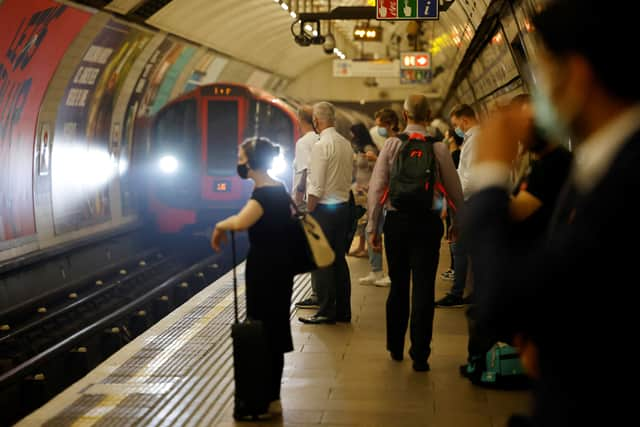TfL scrapping Day Travelcard will ‘absolutely’ put off visitors, Sadiq Khan warned
and live on Freeview channel 276
A disabled-led transport group has warned scrapping Day Travelcards will “absolutely” dissuade people from visiting London, after the mayor signed an order to stop selling them by January.
The scheme was up for consultation as Transport for London (TfL) sought ways to generate a further £0.5-£1 billion a year of additional revenue from 2023, as required by the government as part of a funding deal agreed during Covid.
Advertisement
Hide AdAdvertisement
Hide AdGroups, such as London TravelWatch, have raised concerns about the Day Travelcard’s potential removal, warning the impact will likely be hardest felt by lower income Londoners and people with disabilities.
The London mayor Sadiq Khan however signed a decision notice last week, giving the scheme a six month notice period unless alternative funding is found.
A spokesperson for the mayor said Mr Khan only considered withdrawing the Day Travelcard “to meet the requirements of TfL’s funding settlement with government”, adding “he has been clear he does not want to do so, but feels that he has been left with no viable alternative”.
At a London Assembly transport committee meeting on July 13, Madeleine Stewart, policy and public affairs lead at Transport for All, told Assembly Members: “In general, travelcards are easier and simpler for a lot of people to use. Wheelchair users, for example, you can show a staff member at the barrier [your ticket]…without that, if you’re using pay-as-you-go or you’re tapping an Oyster [card], you have to get very, very close.”
Advertisement
Hide AdAdvertisement
Hide AdNow, speaking to LondonWorld, Ms Stewart said the removal of the Day Travelcard would “absolutely” dissuade people, especially those with disabilities, from travelling into London.
Her colleague, Emma Koprena, who heads up the insight and advice team, said one of the biggest benefits of the scheme on people with disabilities is its simplicity.
For example, she said she has heard from quite a few people through Transport for All’s helplines that they rather use cash to buy a single ticket, such as a Day Travelcard, than pay-as-you-go (PAYG) to navigate around the capital.
“It’s significantly more difficult to get your head around a whole system, rather than just doing one thing,” she said.
Advertisement
Hide AdAdvertisement
Hide Ad

Ms Koprena referenced a particular case from a few years ago, involving someone with a learning disability who could only travel independently if they were able to use cash and see the money they were paying with.
“Whenever they would travel alone, they would rely on paper tickets that were purchased with cash specifically, because they did not have a bank account, they did not have a card, and it really enabled them to go out and about independently.”
Ms Stewart said the way the PAYG infrastructure is built is also often not particularly friendly to people with various disabilities, from the bit you tap being quite high, to the colours used to indicate different services not designed for those with visual impairments.
Asked what TfL could do to try to mitigate some of the issues raised, Ms Stewart said one move would be to enable passengers to more easily pay using cash.
Advertisement
Hide AdAdvertisement
Hide Ad“There has to be another way of letting people pay for a visit or pay for their travel in London through cash,” she said.
She said reintroducing the option of the refund for the Oyster Card would also be “a good step in the right direction”, while Ms Koprena added simplifying the process of applying to reverse costs, due to people with disabilities often exceeding maximum journey limits and so being charged again, “would greatly help”.
TfL ‘continues to look for alternative options’
The mayor’s spokesperson said Mr Khan “reluctantly” agreed for TfL to initiate the six-month notice period which could see the Day Travelcard removed.
They added: “The mayor and TfL remain open to discussing all options with both the Department for Transport (DfT) and the train operating companies, and will work with them to try to find a financially acceptable alternative that would allow Day Travelcards to remain available.”
Advertisement
Hide AdAdvertisement
Hide AdA TfL spokesperson said the authority’s Equality Impact Assessment (EqIA) was considered when making the decision, and reiterated the move to sign the decision notice was a “reluctant” one.
“This is the first stage in a process and there are no changes to tickets at this time,” they said. “This is an operational decision that has been taken now to ensure that TfL meets the requirements of its funding agreement, but TfL continues to look for alternative options.
“While this six-month notice-period is now underway, this decision remains reversible and does not therefore mean that Day Travelcards will be withdrawn. TfL is keen to work collaboratively with the DfT and Rail Delivery Group to discuss options that would allow Day Travelcards to continue to be provided, while ensuring TfL can meet the requirements of the funding settlement with government.
“The existing daily pay as you go caps on contactless or Oyster, which are used by the overwhelming majority of those travelling, will not be affected by this.”
If ultimately withdrawn, the Day Travelcard will stop being sold in January 2024.
Comment Guidelines
National World encourages reader discussion on our stories. User feedback, insights and back-and-forth exchanges add a rich layer of context to reporting. Please review our Community Guidelines before commenting.
